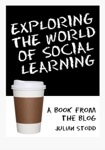Why is Oxford, with the Oxford Internet Institute and a renowned Education Department not joining the e-learning revolution?
700 years of taking things at their own pace? Their research shows that it adds nothing to their successful and 'elite' model of teaching and research? They don't need to attract students. There can be over 100 applying for every available place.
They do however need to diversify.
It's taken 30 years to tip the profile of the Oxford student from 72% privately educated public school boy to around 49% privately educated and a 50/50 male/female split. By not joining in will they perpetuate the 'Ivory Towers' impression?
There are other reasons to develop massive open online courses, not least to appear open and accessible. The University of Southampton, by contrast, home to Sir Tim Berners-Lee and the only PhD programme on WebScience, have produced nearly a dozen 'massive open online courses' (MOOCs) over the last 18 months. I believe all, or most are on the FutureLearn platform; all are also embedded on the Southampton virtual learning environment (VLE) for students to do to supplement their course work. This I see as an important, valuable and better way to blend the learning experience. It would have been my prefered way of learning, offering some flexibility on the traditional course of lectures.
Is the Open University the only one to have entire degree courses online?
Not a book, not a residential, no face-to-face tutorials either.
By the time I had completed the MAODE, five modules over 3 1/2 years I assumed many other entire degrees, let alone individual courses would be offered in this way. They are not. A MOOC delivering two/three hours of crafted, scaffolded learning a week over a few weeks is demanding enough ... but a module that runs for six months, with 12/16 hours, even 22 hours a week? Though a 'prestige' course the OU MBA programme will spend, I believe, around £3m and three years creating a single one of its modules. These are expected to run for eight to ten years.
How much therefore to design, write and produce five of these, let alone the running and administrative costs?
Is it the right thing to do? E-learning is not a feature film. It is more like a garden; it must change and adapt to the seasons and climate change.
There was no e-learning climate two decades ago; it's the ozone of learning.
FutureLearn prides itself on responding to feedback. I've seen many subtle, responsive changes: several ways through discussion threads like this one which often run to several THOUSAND comments, pooling of creation skills amongst those producing the courses and greatly improving the forms of assessment: quizzes that are masterfully written to teach and to test, tasks for peer review that are part of the learning experience and now opportunities to sign up for a written exam - you pay a fee to attend a test centre, take the exam, and submit your paper. Of course, at this stage the idea of 'Open' is greatly weakened because once again their are parameters and barriers caused by geography and cost, probably also of confidence and familiarity with the formal written exam away from the keyboard and screen.
I reflect, today, on FIVE YEARS of formally studying Open and Distance Education. My blog runs to over 2,500 posts. What next? The same again? I've neither found a home in academia, or in corporate learning and development. Have I studied the wrong subject? I hanker forever to be telling stories. I thought I would successfully make the transition from linear-based video learning and development where I'd worked for some twenty years, but have not and to rub my face in it the demand for video is finally increasing. Though never again the broadcast like budges we had for multiple cameras and live shoots, for a mini-bus of actors and a director from 'The Bill,' and special effects from The Mill.
I have had my eye on the Creative Writing Course for at least four of the last five years, but felt, for a change, I'd finish something. Instead, I find I am back in March 2006 going through two large 'Really Useful Boxes' which contain the printed off manuscripts of two novels, a couple of screenplays, a TV play and assorted short stories.
Is this my life? Dominated by a history of making the wrong choices?
